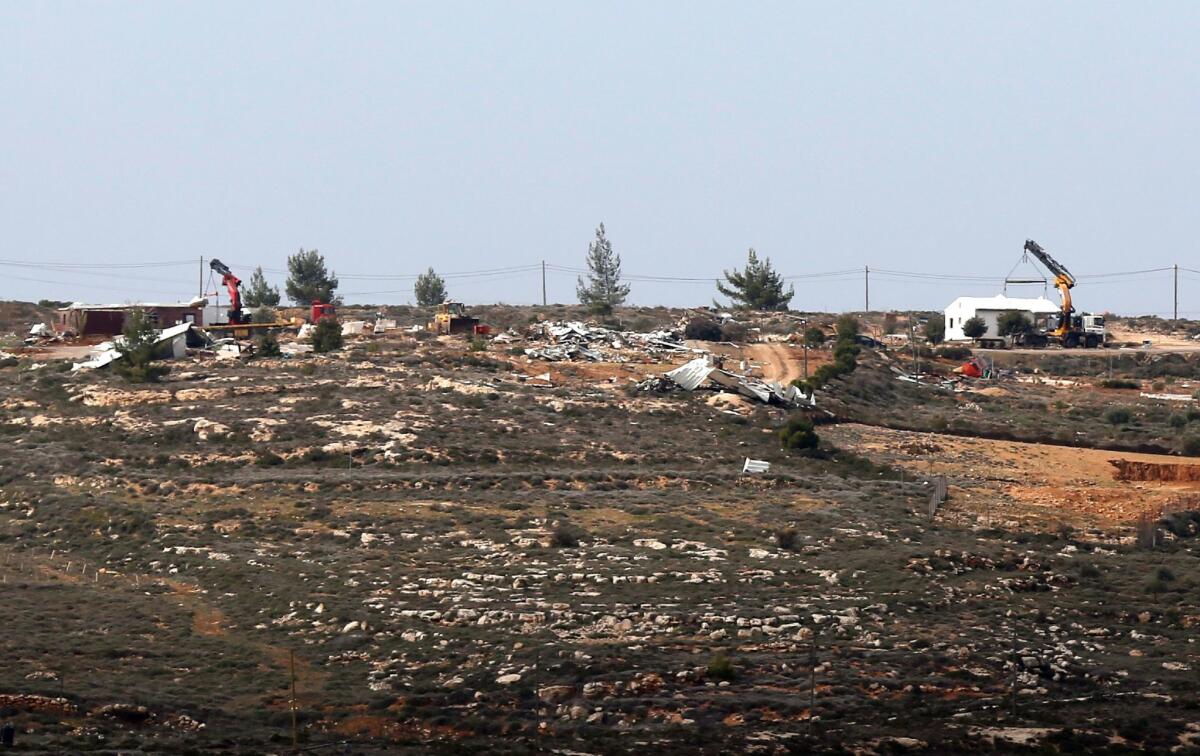Despite warming ties with Washington, Netanyahu faces growing challenges in Israel

- Share via
Reporting from Ofra, West Bank — When the Israeli government reluctantly complied with a court order and booted several hundred Israeli settlers from a hilltop outpost in the West Bank early this month, Prime Minister Benjamin Netanyahu’s administration promised to break ground within weeks on a new settlement in another part of the disputed territory. There was little reason to doubt it.
The election of President Trump seemed to clear the way for Netanyahu to chart his own course on the Middle East peace process and play to his right-wing base, which favors the construction of more settlements and opposes the creation of a Palestinian state.
Though he publicly endorsed the so-called two-state solution in 2009, Netanyahu had always been lukewarm to the idea. Breaking with the Obama administration, Trump has indicated that the U.S. would no longer insist on it. Returning from his visit to Washington last week, Netanyahu boasted of his personal friendship with Trump and declared a “new day” in ties with the U.S.
But now the prime minister is hesitating on his promise to the settlers of the outpost known as Amona — and playing down expectations from his staunchest supporters for a dramatic makeover of the West Bank.
On Monday, the newspaper Haaretz quoted Netanyahu telling members of his own Likud Party that the election of Trump “is a historic opportunity, but one must understand the limits of that opportunity.”
When it comes to building in the West Bank, “things aren’t as simple as they look,” he reportedly said.
Since Trump won, Netanyahu has faced regular calls from Likud and the Jewish Home party to annex parts of the West Bank, establish new settlements and speed up building in existing ones.
Outside Jerusalem, posters along the highway to the West Bank settlements demand that the prime minister exercise Israeli “sovereignty” over territory that the Palestinians claim as part of their hoped-for future state.
“The ball isn’t in [the hands of] Washington, but in Jerusalem,” Yossi Dagan, a Likud member and a settler leader, wrote on his Facebook page shortly after Netanyahu’s meeting with Trump in Washington.
That may be too simplistic. Though the U.S. may have loosened the reins, the prime minister cannot simply run free.
The international community as a whole remains committed to a two-state solution and could impose sanctions on Israel if it annexes more disputed territory.
Trump himself may not be quite the partner that right-wing Israelis want. Though he has expressed doubts about the two-state solution and appointed key aides who oppose it, Trump also told Netanyahu to “hold off” on expansion of settlements.
Further complicating the prime minister’s situation is a pair of investigations into whether he unlawfully accepted gifts from wealthy businessmen and offered to push legislation as part of secret deal with a newspaper publisher to secure more favorable coverage.
The prime minister has denied any wrongdoing. But the investigation has raised the possibility that he might face a bribery indictment, leading to speculation that members of his own government might try to replace him.
“I would not want to be Netanyahu’s strategist today,’’ said Stephan Miller, an Israeli American political consultant. “An indictment could sour support among those who support him politically but don’t like him personally.”
Netanyahu said in January that he’d agree to give Palestinians a “state-minus” — a demilitarized state where Israel’s army retains ultimate control over the West Bank. But he’s provided few details about what that means.
Once Netanyahu starts to trace out a plan for the Palestinians, it might put him at loggerheads with ideologues in his governing coalition.
“He’s in a Catch-22,” said Yoaz Hendel, a former communications advisor to Netanyahu. “Right now, no one really knows what he wants.”
The settlers of Amona are Netanyahu’s most immediate challenge.
Israel’s Supreme Court ruled two years ago that the government could not allow them to stay, because the land is privately owned Palestinian property. To coax the settlers to leave peacefully, the government pledged to start construction within weeks on an empty hilltop near the settlement of Shilo several miles away.
“We are waiting for the prime minister to make good on his promise,” said Yedidya Ben Zimra, one of several settlers at a “protest tent” set up outside the prime minister’s house in Jerusalem. “Netanyahu is looking for a way out of it.’’
If he does honor the promise, it would be the first time since the 1990s that Israel has officially set out to build an entirely new settlement.
A few days after Trump told him to “hold off,” Netanyahu signaled to members of his party that he would have to postpone his promise.
Dozens of Amona settlers are now living in a dormitory in the West Bank settlement Ofra.
“Everyone knows that Prime Minister Netanyahu doesn’t want to shake anything up,’’ said one of them, 44-year-old Eli Greenberg. “Netanyahu keeps on preserving the two-state solution, he doesn’t want anything to change. It’s a grave situation.”
Since leaving Amona, Tamar Ben Izri, 38, and her husband and five children have been living in two small dorm rooms cramped with bunk beds.
The family and others have refused to leave, hoping to maintain pressure on the government.
“If we move to a mobile home, Bibi will forget about us,’’ Ben Izri said, using the prime minister’s nickname.
Mitnick is a special correspondent.
ALSO
Iran celebrates an Oscar win — and a chance to needle President Trump
On the other side of the wall: Mexicans on the border are ‘psychologically traumatized’
Islamic State is showing stunning resistance as Iraqi troops try to breach west Mosul
More to Read
Sign up for Essential California
The most important California stories and recommendations in your inbox every morning.
You may occasionally receive promotional content from the Los Angeles Times.










